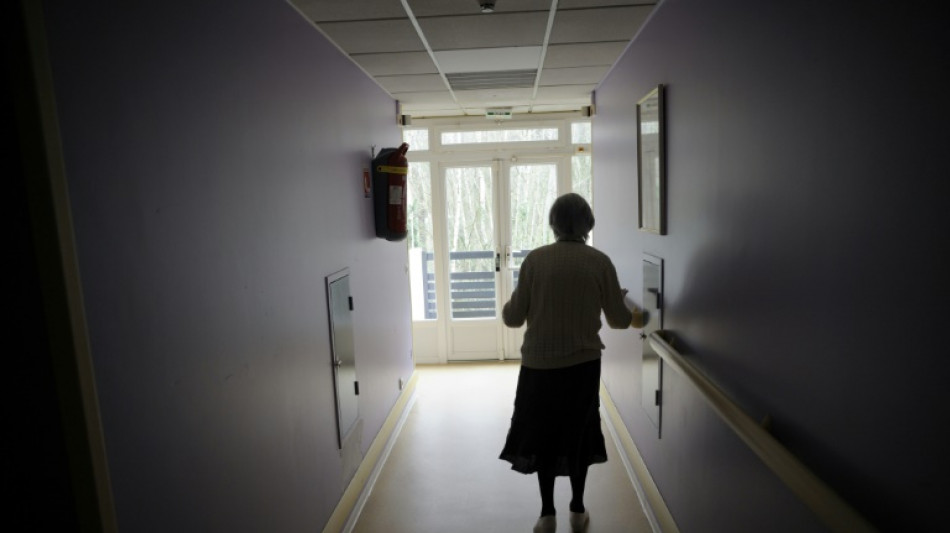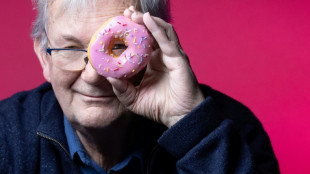
-
 Prince William plays football, volleyball in Rio on climate trip
Prince William plays football, volleyball in Rio on climate trip
-
Jamaicans mobilize aid in aftermath of Melissa's wreckage

-
 Starbucks cedes China control to Boyu Capital
Starbucks cedes China control to Boyu Capital
-
'Wild at Heart' actress Diane Ladd dies at 89

-
 Xhaka lifts Sunderland into fourth after Everton draw
Xhaka lifts Sunderland into fourth after Everton draw
-
Brazil records biggest annual fall in emissions in 15 years: report

-
 Victor Conte, mastermind of BALCO doping scandal, dead at 75: company
Victor Conte, mastermind of BALCO doping scandal, dead at 75: company
-
Trial opens in 1st US civil case on 2019 Boeing MAX crash

-
 Barrett brothers out of All Blacks' clash with Scotland
Barrett brothers out of All Blacks' clash with Scotland
-
Medieval tower partially collapses in Rome, trapping worker

-
 Arsenal's Arteta says injured Gyokeres out of Slavia Prague tie
Arsenal's Arteta says injured Gyokeres out of Slavia Prague tie
-
Alonso says 'quality' Wirtz helped get him Real Madrid job

-
 US Fed's Cook warns inflation to stay 'elevated' next year
US Fed's Cook warns inflation to stay 'elevated' next year
-
Blue heaven: huge crowds salute Los Angeles Dodgers in victory parade

-
 Dutch centrist Jetten clinches election win: final tally
Dutch centrist Jetten clinches election win: final tally
-
Mamdani extends olive branch to anxious NY business community

-
 Sierra Leone chimpanzee sanctuary reopens after deforestation protest
Sierra Leone chimpanzee sanctuary reopens after deforestation protest
-
Shein bans sex dolls after France outrage over 'childlike' ones

-
 England full-back Steward doubtful for Autumn rugby clash with Fiji
England full-back Steward doubtful for Autumn rugby clash with Fiji
-
Bayern know how to 'hurt' PSG, says Neuer

-
 Rybakina downs Swiatek to reach WTA Finals last four
Rybakina downs Swiatek to reach WTA Finals last four
-
Ex-France international Ben Yedder to stand trial on rape charges

-
 Djokovic confirmed for ATP Finals, says Italian federation boss
Djokovic confirmed for ATP Finals, says Italian federation boss
-
Trent should be remembered for 'great' Liverpool moments, says Slot

-
 Stock markets diverge despite boost from AI deals
Stock markets diverge despite boost from AI deals
-
Prince William awed by Rio on climate-focused trip to Brazil

-
 Violence in Sudan's El-Fasher could be war crimes, says top court
Violence in Sudan's El-Fasher could be war crimes, says top court
-
Rybakina downs Swiatek in WTA Finals

-
 Turkey, Muslim allies say Palestinian self-rule key to Gaza future
Turkey, Muslim allies say Palestinian self-rule key to Gaza future
-
Tens of thousands shelter as typhoon slams into Philippines

-
 Stock markets rise as tech sector buoyed by fresh AI deal
Stock markets rise as tech sector buoyed by fresh AI deal
-
Vitinha says PSG-Bayern Champions League clash will show who's 'best'

-
 Arsenal: The unstoppable Premier League force?
Arsenal: The unstoppable Premier League force?
-
Denmark inaugurates rare low-carbon hydrogen plant

-
 Springboks back Ntlabakanye call-up despite doping probe
Springboks back Ntlabakanye call-up despite doping probe
-
German plans to lower industrial power costs from January

-
 Christian, Muslim Nigerians push back on threatened US strikes
Christian, Muslim Nigerians push back on threatened US strikes
-
Nigeria's Rivers United paired with African champions Pyramids

-
 India women cricketers hail new era but challenges remain
India women cricketers hail new era but challenges remain
-
'Heroic' worker praised as man charged over UK train stabbings

-
 Bangladesh ex-PM Zia to contest elections: party
Bangladesh ex-PM Zia to contest elections: party
-
Tanzania president sworn in as opposition says hundreds killed in protests

-
 India announces $5.75 million reward for women cricket World Cup winners
India announces $5.75 million reward for women cricket World Cup winners
-
Spain regional leader resigns, a year after deadly floods

-
 Video game creators fear AI could grab the controller
Video game creators fear AI could grab the controller
-
France threatens Shein ban if 'childlike' sex dolls reappear

-
 International cricket returns to Faisalabad with Pakistan-South Africa ODIs
International cricket returns to Faisalabad with Pakistan-South Africa ODIs
-
Afghan govt says quake kills 20, injures over 500

-
 'We're all too rich,' says photo legend Martin Parr
'We're all too rich,' says photo legend Martin Parr
-
Tanzania president inaugurated as opposition says hundreds dead

| RBGPF | -3.95% | 76 | $ | |
| SCS | -0.76% | 15.84 | $ | |
| AZN | -0.83% | 81.72 | $ | |
| NGG | -0.68% | 74.74 | $ | |
| RYCEF | 1.37% | 15.36 | $ | |
| BTI | 2.38% | 52.44 | $ | |
| BCC | -3.15% | 68.34 | $ | |
| RELX | -0.16% | 44.17 | $ | |
| CMSC | -0.34% | 23.67 | $ | |
| GSK | -1.1% | 46.35 | $ | |
| RIO | -1.95% | 70.37 | $ | |
| BCE | -0.84% | 22.67 | $ | |
| JRI | -0.14% | 13.88 | $ | |
| BP | -0.75% | 34.87 | $ | |
| CMSD | -0.38% | 23.9 | $ | |
| VOD | -5.89% | 11.38 | $ |

Many dementia cases could be prevented, but far from all: study
Millions of cases of dementia could be prevented or delayed by reducing a range of risk factors such as smoking or air pollution, according to a major new study, though outside experts warn that such measures can only go so far.
The debilitating condition, which progressively robs people of their memories, cognitive abilities, language and independence, currently affects more than 55 million people across the world.
Dementia is caused by a range of diseases, the most common of which is Alzheimer's.
A huge review of the available evidence published in The Lancet journal on Wednesday said that the "potential for prevention is high" in the fight against dementia.
The study follows a previous report in 2020 that also emphasised the importance of prevention.
At the time, the international team of researchers estimated that 40 percent of dementia cases were linked to 12 risk factors.
The factors included people having a lower level of education, hearing problems, high blood pressure, smoking, obesity, depression, physical inactivity, diabetes, excessive drinking, traumatic brain injury, air pollution and social isolation.
The latest update adds two more risk factors: vision loss and high cholesterol.
"Nearly half of dementias could theoretically be prevented by eliminating these 14 risk factors," the study said.
- EU turns down new drug -
Decades of research and billions of dollars have failed to produce a cure or truly effective drug for dementia.
But since the start of last year, two Alzheimer's treatments have been approved in the United States: Biogen's lecanemab and Eli Lilly's donanemab.
They work by targeting the build-up of two proteins -- tau and amyloid beta -- considered to be one of the main ways the disease progresses.
However, the benefits of the drugs remain modest, they have severe side effects, and they are often very expensive.
In contrast to the US, the European Union's medicine watchdog last week refused to approve lecanemab, and it is still considering donanemab.
Some researchers hope the fact that the new drugs work at all means they will pave the way for more effective treatments in the future.
Others prefer to focus on ways to prevent dementia in the first place.
Masud Husain, a neurologist at the UK's University of Oxford, said that focusing on risk factors "would be far more cost effective than developing high-tech treatments which so far have been disappointing in their impacts on people with established dementia".
- 'How much more could we do?' -
The Lancet study was welcomed by experts in the field, among whom the importance of prevention is hardly debatable.
However, some said the idea that nearly half of all dementia cases could be prevented should be put in perspective.
It has not been proven that the risk factors directly cause dementia, as the authors of the study acknowledged.
For example, could it be dementia that is causing depression, rather than the other way around?
It is also difficult to separate the risk factors from each other, though the researchers tried.
Some could be intrinsically linked, such as depression and isolation, or smoking and high blood pressure.
Above all, many of the risk factors are societal scourges that have long proven near impossible to fully address.
The study lays out different recommendations ranging from the personal -- such as wearing a helmet while cycling -- to governmental, such as improving access to education.
"It is not clear whether we could ever completely eliminate any of these risk factors," Charles Marshall, a neurologist at Queen Mary University of London, told AFP.
"We already have public health programmes to reduce smoking and hypertension (high blood pressure), so how much more could we do?"
Tara Spires-Jones, a neuroscientist at the University of Edinburgh, said it was important that "we do not blame people living with dementia for their brain disease".
That is because "it is clear that a large portion of dementias could not be prevented due to genes and things beyond people's control, like opportunities for education as children", she added.
P.Keller--VB




